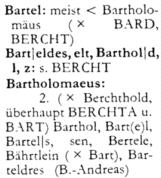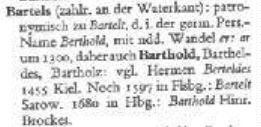 Last uptaded: Apr 17th, 2001
Last uptaded: Apr 17th, 2001Preface: my Bartels ancestors came some 200 years ago to Southern Poland from somewhere in the West. The name was transformed to Bartelski soon thereafter to assimilate with local inhabitants ("-ski" is one of most popular Polish suffixes). However I'm still interested in all Bartels-related topics. These pages were designed to provide you with as much theoretical analysis as possible to give you wider background for your research. I would like to thank all the people who so often share their knowledge with me and provide me with various data of value taking a big part in the process of constant improvement of these pages.
Etymology: I have managed to find three German books describing the origin of this name. Two of them I got thanks to courtesy of Kai Krasnodembski from Germany who sent me the photo copies.
 The first book by Max Gottschald "Deutsche Namenkunde"
(issued Berlin 1936) says that the form Bartel (for our purpose should be
treated equally with Bartels) comes usually from Bartholomäus.
Another possible sources are the German word "bard" meaning "beard" and
an old-fashioned "bercht"="shining, clear". The same affects Barteldes,
Bartelt, Barthold (important in the lower part of the text).
The name Bartholomaeus arose from the Greek "son of Tolmai" and one
of its possible appearences is Bartels together with other forms as
Berchthold, Barthol, Bartl and more.
The first book by Max Gottschald "Deutsche Namenkunde"
(issued Berlin 1936) says that the form Bartel (for our purpose should be
treated equally with Bartels) comes usually from Bartholomäus.
Another possible sources are the German word "bard" meaning "beard" and
an old-fashioned "bercht"="shining, clear". The same affects Barteldes,
Bartelt, Barthold (important in the lower part of the text).
The name Bartholomaeus arose from the Greek "son of Tolmai" and one
of its possible appearences is Bartels together with other forms as
Berchthold, Barthol, Bartl and more.
 Another book indicates that Bartels is
subordinate to Bartel or Bartelt. Bartel (alternative spelling
Barthel what does not affect the pronunciation since 'th' is read as 't' in German)
may be mutation of Pertel or something. These names appeared in historical
data as early as in the 14th and the 15th century. According to the rules of German
grammar des Bartels is relevant to English "of Bartel" or "Bartel's".
This means that Bartels may be patronymic (patronymic=coming from
the name of sb's father) form to Bartel. On the other hand it may be well a
derivative from Bartelt that comes from another name Berthold.
Construction des Bartelts may be easily turned to Bartels. Finally,
Berthold may come into Barteldes (Berthold -> Bertold ->
des Bertoldes and a couple of simple vowel alternations) what may be
shortened to Bartels.
Another book indicates that Bartels is
subordinate to Bartel or Bartelt. Bartel (alternative spelling
Barthel what does not affect the pronunciation since 'th' is read as 't' in German)
may be mutation of Pertel or something. These names appeared in historical
data as early as in the 14th and the 15th century. According to the rules of German
grammar des Bartels is relevant to English "of Bartel" or "Bartel's".
This means that Bartels may be patronymic (patronymic=coming from
the name of sb's father) form to Bartel. On the other hand it may be well a
derivative from Bartelt that comes from another name Berthold.
Construction des Bartelts may be easily turned to Bartels. Finally,
Berthold may come into Barteldes (Berthold -> Bertold ->
des Bertoldes and a couple of simple vowel alternations) what may be
shortened to Bartels.
 The third book brings us the widest
range of useful information. It says that the name was most popular at the
Northern Sea coast ("Waterkant"). It is confirmed that the name is patronymic to Bartelt
which is derived from Berthold. About the year 1300 "er" clusters
started gradually alter to "ar". This phenomenon was most common in "Niederdeutsch" which is
the dialect of German used in the North. Some lateral forms arose this way
like Barthold, Barteldes or Bartholz.
Barthold spelled in German "Bartolt" is already close to Bartelt what
is supposed to be direct predecessor of Bartels, so does Bartholz where
only vowel alternation o:e had to take place (Bartholz -> Bartelz
with German "z" spelled like "ts" does not require any commentary).
Barteldes was already discussed
above. In addition we get a couple of examples of people from the past: Herman
Berteldes from Kiel in 1455, Bartelt (please notify the form used as a first name)
Sarow from Flensburg (small city near the border with Denmark) in 1597,
Barthold Hinrik Brockes from Hamburg in 1680.
The third book brings us the widest
range of useful information. It says that the name was most popular at the
Northern Sea coast ("Waterkant"). It is confirmed that the name is patronymic to Bartelt
which is derived from Berthold. About the year 1300 "er" clusters
started gradually alter to "ar". This phenomenon was most common in "Niederdeutsch" which is
the dialect of German used in the North. Some lateral forms arose this way
like Barthold, Barteldes or Bartholz.
Barthold spelled in German "Bartolt" is already close to Bartelt what
is supposed to be direct predecessor of Bartels, so does Bartholz where
only vowel alternation o:e had to take place (Bartholz -> Bartelz
with German "z" spelled like "ts" does not require any commentary).
Barteldes was already discussed
above. In addition we get a couple of examples of people from the past: Herman
Berteldes from Kiel in 1455, Bartelt (please notify the form used as a first name)
Sarow from Flensburg (small city near the border with Denmark) in 1597,
Barthold Hinrik Brockes from Hamburg in 1680.
The origin of the name Bartels may be thus on of these:
I may put safe statement that very few people manage to complete full historical date proving the real origin of their name and the rest (including myself) must be satisfied with the peace of information included above.
An important fact is that the hypotheses are mutually exclusive as they do not interfere. It is not possible that the two main lines (Bartholomäus and Berthold) arose from the same word (or whatever any pre-christian cluster of sounds may be called), because the name Berthold has got doubled consonants in the suffix part (l+t or l+d) what is not the case in the word Bartholomäus. There haven't ever been proved that any consonant duplication of that kind ever occured in German. The names sound pretty much like each other, but it's nothing more that the coincidence.
Of course we must be aware that all the analysed processes took place at the times when last names were not in common use. This particularly affects lower classes of the society among who the name (this used to look more like what we call today the "nickname") was usually closely related to the name of the father or any characteristic, like having an outstandingly big beard or being the most witty and brilliant ("shining, clear") intellect of the entire village... Due to lack of administrative procedures the last names at the stage of being formatted were very much prone to numerous phonetic and ortographic changes. This explains my statements like "may easily become", "leads straight to", "was changed to" and others.
Areas of dense appearance: the regions where the name is very
popular are the lands of Northern Germany: mainly Schleswig-Holstein and
so called "Waterkant" that means the coast of the Northern Sea but also
Niedersachsen and Western Mecklenburg. There are enough proofs of its
appearance in Ost Friesland as well. Apart from these, some Bartels' may
be probably found in Southern Denmark and only 11 people named Bartels live
in Poland. See the map to learn where
are the regions mentioned above in case you didn't know (Bartelsdorfs are
marked with red stars, other cities mentioned above with the yellow). There is The
Great Geographical Encyclopaedia of the Kingdom of Poland issued in the
19th century (as much as 17 volumes were edited!) bringing thousands of
names of people settling all around Poland. But the name Bartels appears
there only twice. It says that Jan Bartels rented in 1662 the Cuiavian
village named Malarki paying in advance 450 zlotys for 10 years,
that is 45 zlotys per year. The deal was prolongated after 10 years, but
the price rose to 800 zlotys for another decade. Jan Bartels died circa
1680, however. The second appearence of the name says, that Mr. Bartels
from Rügen (the German island in Northern Mecklenburg) bought some
properties near Zarnowiec village short before 1880, paying 110 000
tallars for all. There are complete data concerning the spread of
Bartels (and Bartel)
name in Poland. However there are too few Bartels' to consider the
distribution to be anything more than the coincidencial chaos and on the
contrary the name Bartel, fairly popular in Poland might (unlike
Bartels! The -s suffix is not known in Polish language) have arisen
in a purely Polish, completely different way than the names analysed here,
like from an old-fashioned Polish word bart, meaning "the axe". So please
be careful and don't draw rush conclusions from these data too fast. They
might be misleading.
For those of you who don't know European geography well or all those who
just want to take a wide look at the areas where the name was and perhaps
still is most popular see the map of Europe.
The smaller area in the East was called Ostpreussen (in 1945 split between
USSR and Poland) and was a teritory where a lot of imigrants from Northern
Germany actually settled. The green arrow shows the direction of the migrations.
The density of the appearence of the name reflexes deeply in the toponomy
of the specified regions as well (see the next paragraph for more
information on that topic).
The toponymic analysis: The toponomy is a branch of
science that goes about studying the historical background of the
geographical names. There are numerous places bearing the names strongly
connected with Bartels.
Famous Bartels' around the world: the most famous Bartels was probably Michael Bartels, former Formula 1 driver, Steffi Graf's ex-fiancé. There was a prominent scientist, geophysicist Julius Bartels (1899-1964) as well. One of Polish well-known satirists was named Arthur Bartels (1818-1885) but this was not his real name. One of the major streets of Adelaide, Southern Australia is named after Adolph Bartels, who was one of the first Lord Majors of the City in the 19th century.
Links to other sites concerning the name: the Bartels info at the Web is yet not very well developed. There are several servers carrying Bartels-related information.
Bibliography:
1. B.Chlebowski, F.Sulimierski, Wl.Wlodarski "Slownik geograficzny Krolestwa
Polskiego", vol. I-XIV, Warszawa 1880 (in Polish)
2. H.Gornowicz "Toponimia powiatu starogardzkiego", Wroclaw 1985 (in Polish)
3. M.Gottschald, "Deutsche Namenkunde", Berlin 1936 (in German)
4. K.Rymut "Slownik nazwisk wspolczesnie w Polsce uzywanych", Krakow 1992 (in Polish)
5. K.Rymut and others "Nazwy miejscowe Polski" , Krakow 1996 (in Polish)
Prepared and maintained by Wojtek Bartelski.
 Stats since 17 Nov 2000.
Stats since 17 Nov 2000.